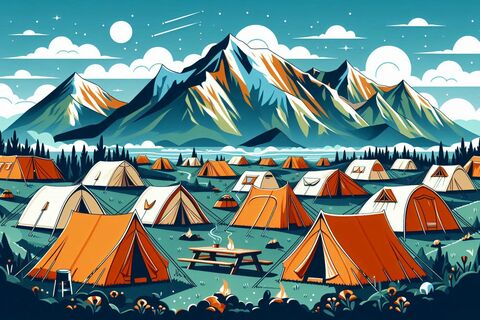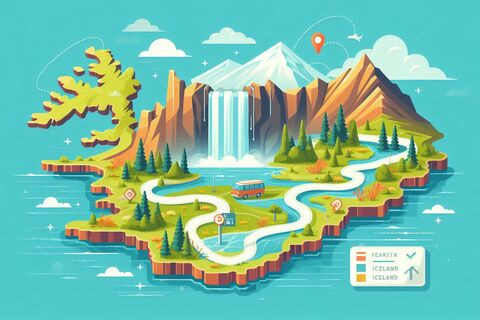Northern Lights in Iceland
Iceland is one of the best destinations in the world to witness the northern lights, those breathtaking dancing lights that illuminate the night sky. If you're planning a trip to Iceland to see this spectacular natural phenomenon, here’s a comprehensive guide to help you plan and maximize your chances of seeing them.
What are the northern lights?
The northern lights, or aurora borealis, are natural light displays caused by the interaction of solar particles with Earth's magnetic field. These charged particles enter the atmosphere and create waves of light that appear as curtains, arcs, or spirals in the sky. Green is the most common color, but reds, purples, and blues can also be seen.
Best time to see the northern lights in Iceland
Optimal season
The northern lights are primarily visible in Iceland during the winter months, from September to April. Winter is ideal because the long, dark nights provide the perfect conditions for seeing the auroras.
Time of day
The northern lights are typically visible between 9:00 PM and 2:00 AM. However, they can appear at any time during the night, especially on very dark nights.
Weather conditions
Clear skies are essential for viewing the northern lights. Clouds can obscure the show, so it's crucial to check the weather forecast before heading out. Remote areas away from city lights, like the Icelandic countryside, offer the best conditions for viewing.
Where to see the northern lights in Iceland
While the northern lights can be seen all over Iceland, certain locations offer particularly good conditions.
Reykjavík and surroundings
Even in the capital, you can catch a glimpse of the northern lights. However, it's recommended to move away from light pollution. The Grótta lighthouse or nearby beaches are good spots to observe from.
Thingvellir national park
Located about an hour’s drive from Reykjavík, this park offers stunning landscapes and enough darkness to admire the northern lights in a majestic natural setting.
Northern Iceland
Regions like Akureyri or Lake Mývatn, further north, often offer spectacular views of the auroras, thanks to clearer skies and fewer people.
Southeast Iceland and Jökulsárlón Glacier Lagoon
This area not only provides breathtaking landscapes but also prime conditions for aurora viewing. You might even see the lights reflected in the icy waters of the lagoon, creating a dreamlike scene.
Planning your aurora viewing
Check aurora forecasts
Websites and apps like Vedur.is, Iceland’s meteorological website, provide northern lights activity forecasts. The Kp index is used to measure aurora activity, ranging from 0 to 9. A Kp forecast of 3 or higher is promising for Iceland.
Choose a dark night
It’s best to observe the auroras away from the full moon, as its brightness can diminish visibility. A moonless night significantly increases your chances of seeing vibrant lights.
Be patient
The northern lights are unpredictable. You may need to wait several hours in cold conditions before the show begins. Bring warm clothing, a thermos of hot drinks, and stay patient.
Practical tips for photographing the northern lights
Capturing the beauty of the northern lights can seem tricky, but with the right settings, you can take stunning photos.
Recommended equipment
- DSLR or mirrorless camera: Smartphones, while improved, usually don't capture the auroras well.
- Tripod: A stable support is essential for long exposures.
- Wide-angle lens: A lens with a wide aperture (f/2.8 or lower) will allow more light into the camera.
Camera settings
- ISO: Set your ISO between 800 and 1600 to capture enough light.
- Aperture: Use the widest possible aperture (small f/stop, e.g., f/2.8).
- Shutter speed: Between 5 and 25 seconds, depending on the brightness of the lights.
- Manual focus: Set your focus to infinity for sharp images of the sky.
Northern lights guided tours
If you prefer to let professionals handle the details, many tours across Iceland are available, with experienced guides who will take you to the best spots.
- Bus tours: These tours often depart from Reykjavík and are ideal for those on a budget.
- Super Jeep tours: These off-road vehicles will take you to more remote locations away from the crowds.
- Aurora cruises: Heading out to sea to observe the northern lights is a unique experience, especially from Reykjavík.
What to do if you don’t see the northern lights
Iceland is rich in natural wonders. If the auroras don’t make an appearance, make the most of your trip by exploring sites like geysers, waterfalls, or hot springs.
Conclusion
Watching the northern lights in Iceland is a magical, unforgettable experience, but it requires some planning. By choosing the right time, checking the forecast, and being prepared to wait under a starry sky, you’ll increase your chances of witnessing this fascinating natural display. Enjoy the unique beauty of the northern lights on your trip to Iceland!



